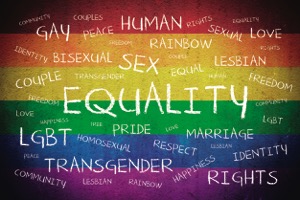
My queer identity is constantly evolving. For too long I resisted this growth process, worrying that my inability to find a perfectly fitting label would cause others to question the validity of my sexuality. So much of my initial journey was consumed by this deep insecurity that the rest of the LGBTQ community wouldn’t find me to be “enough” in some way. As my focus turned inward over time, this fear began to dissipate. I stopped claiming labels to give clarity to others about who I was, and I instead gave myself permission to simply exist in my unique space of queerness.
When I first came out as bisexual, I claimed this word wholeheartedly, as it made logical sense in relation to my life at the time. I was fresh out of high school, a time during which I had only dated cis men, though my physical experiences with women actually preceded those with men. In the context of my teenage years, those experiences had been deemed “just for fun,” so it was an uncomfortable process for me to acknowledge that I was enjoying those moments on a different level than my counterparts. To admit this meant admitting difference, which is terrifying for all people, especially teenagers. On top of this, I had yet to even meet an out lesbian, so that word floated outside of my universe. Being familiar with bisexuality, I claimed this label, which allowed me to blend my past and present existences and continue to explore who I was.
Beginning to date women deepened my understanding of my attraction, and I transitioned to using the words lesbian, gay and pansexual to describe myself. I often found my use of these words to be situational – lesbian when I was first energetically claiming the fact that I was dating women, gay when I was trying to explain my queer attraction to others without feeling boxed in by the lesbian label, and pansexual when I was willing to take the time to delve into the more complex nature of my sexuality. Over time, binary labels were the furthest from a good fit for me, but I grew tired of explaining pansexuality, of having to carry the burden of any explanation at all. A state of queerness became my beacon. Embracing this existence was freeing; living here gave and continues to give me unparalleled autonomy, through which I feel free to live an introspective nature.
I now embrace the grey area that once paralyzed me. As human beings, we inherently grow over time, deepening our understanding of who we are and how we fit into the world around us. I find my sexuality and gender identity to be no different. As I mature, so does my ability to connect with the dynamic nature of my queerness. I am able to step away from defining myself by how I relate to others, breaking down my preconceived notions that my sexuality can be defined by a type of person or my gender can be captured in my clothing choices and embrace the multifaceted nature of who I am – a queer, complex, introspective human being who is lucky enough to fall more in love with who I am every day.











